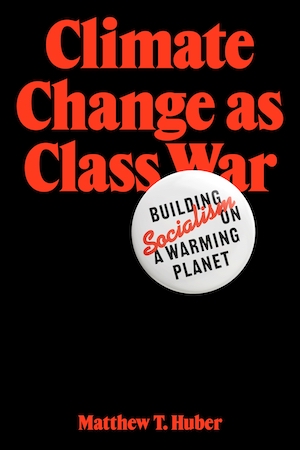为什麽对抗气候变迁会成为一场阶级之战?
-- 在变暖的地球上打造社会主义 --
气候变迁危机主要不是「相信科学」或个人「碳足迹」的问题——它是一个阶级问题,根源在於谁拥有丶控制原物料生产,并且从中获利。像这类问题,将需要一场阶级斗争才能解决。
作者认为碳密集型资产阶级必须面对自身是造成气候变迁的原因之一。然而,专业阶级中气候政治的狭隘和不得人心的根源无法发起一场运动来应对这一项挑战。於此,作者提出另一种能够吸引社会绝大多数人的策略:工人阶级的气候政治。 他将绿色新政(Green New Deal)作为初次尝试引导工人阶级的物质和生态利益,并主张在我们需要大幅转型的能源系统中建立有组织的工会力量。最後,就像 20 世纪初的古典社会主义运动一样,赢得一场气候斗争将需要一种基於全球工人阶级团结形式的国际主义方法。
关於作者
Matthew T. Huber 是美国雪城大学(Syracuse University)公民与公共事务学院的地理学教授。他是《生命之血》(Lifeblood)的作者。
作者上一本书《生命之血》(Lifeblood)书评:
“Lifeblood offers a radically alternative way of thinking about ‘cheap oil’ and ‘oil addiction’ and in so doing peers beneath the liquid surfaces of petroleum to see how the long century of American oil consumption has been central to the rise of American neoliberalism itself. An original and masterful account of oil in contemporary American capitalism.”
—Michael Watts, University of California, Berkeley
“Compellingly presented and enlivened by fascinating archival research, Huber’s arguments about the ‘ecology of politics’ and the centrality of oil to the making of ‘entrepreneurial life’ are important and intriguing.”
—Gavin Bridge, Durham University
“Huber offers a poignant analysis of how oil shapes “the American way of life” and neoliberal hegemony in the US.”
—CHOICE
“Huber makes it abundantly clear that the problems with patterns of oil consumption are not fundamentally technical and economic but cultural, social, and political.”
—Economic Geography
“An incisive look into how oil permeates our lives and helped shape American politics during the twentieth century.”
—New Books in Geography
“The most succinct, theoretically grounded critique of the culture of oil yet in print.”
—Humanities and Social Sciences Review Online
“[Lifeblood Oil] is a compelling account, and is highly recommended.”
—Urban Studies
“Huber takes us. . . into Americans’ own subconscious minds, to their un-thought-out daily patterns, and their emotional attachments to a sense of entrepreneurial success–and shows how these are linked materially to oil.”
—Environmental History
“An elegantly written and empirically rich account which joins economic history, cultural analysis, and Marxist political economy.”
—Human Geography



